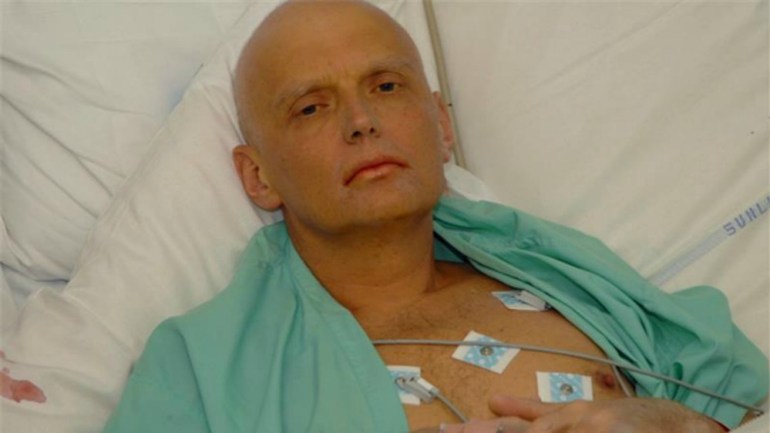
Kyiv, Ukraine – When Yevgeny Prigozhin, head of the Wagner mercenary company, bristled at Russia’s top brass, he did not mince his words.
“Scum”, “damn it” and “go to hell” were among the most quotable phrases from the video rant filled with homophobic slurs and prison slang that was released on Prigozhin’s Telegram channel on May 5.

The diatribe does not seem surprising given his background. In 1981, he was convicted of robbery and assault and served nine years in Soviet jails.
His knowledge of “fenya”, as jail jargon is known, proved important to the Kremlin’s faltering war effort in Ukraine last year when he toured dozens of Russian prisons to enlist tens of thousands of inmates.
But the problem with Prigozhin’s profanities – as well as the corrupting influence of fenya and the overtly romanticised lifestyle of career criminals on Russia’s politics, culture and daily life – lies much deeper.
It was Prigozhin’s boss, Russian President Vladimir Putin, who started peppering his speech with salty phrases and fenya idioms since the dawn of his rule 23 years ago.
Long before former US President Donald Trump built his political career on jingoistic, misogynistic and intolerant parlance, Putin did something similar in Russia – with much broader consequences.
“We’ll soak ’em in the outhouse,” Putin, a newly appointed prime minister in President Boris Yeltsin’s government, said in 1999 about the Russian bombing of Grozny, the capital of the then de facto separatist Chechnya region.
 Wagner Group founder Yevgeny Prigozhin, left, serves food to Putin, centre, during dinner at Prigozhin’s restaurant outside Moscow [File: Misha Japaridze/AP]
Wagner Group founder Yevgeny Prigozhin, left, serves food to Putin, centre, during dinner at Prigozhin’s restaurant outside Moscow [File: Misha Japaridze/AP]
‘I Want Someone Like Putin’
Soviet-era dissident Vladimir Bukovsky, who spent years in gulags, pointed out that the phrase referred to the killing of snitches by drowning them in feces in giant prison outhouses.
But average Russians unfamiliar with fenya’s intricacies liked Putin’s phrase anyway.
Many more colourful, nearly obscene quotes, along with the scrupulously sculpted image of a macho man, paved the way to Putin’s first presidency in 2000.
Women were among his earliest supporters.
“‘Soak ’em in the outhouse’ was more about [Putin] becoming sexually attractive to the women whose men are drunks and who think that they need a strong hand to simply survive,” Nana Grinstein, a playwright whose family fled Russia after the all-out war began in Ukraine last year, told Al Jazeera.
She used an old Russian trope of comparing women to “necks” that support their men, the “heads” of families, and recalled “I Want Someone Like Putin”, a 2003 pop hit that describes a woman who kicks out her substance-abusing lover because she craves someone like the president.
“When these ‘necks’ turned towards Putin, then machismo worked both ways. For men, he became an example because ‘someone like Putin’ is wanted in the most open sexual way,” Grinstein said.
 Russian President Vladimir Putin uses language to reinforce an image of a powerful leader [File: Alexei Babushkin/Sputnik/Kremlin via Reuters]
Russian President Vladimir Putin uses language to reinforce an image of a powerful leader [File: Alexei Babushkin/Sputnik/Kremlin via Reuters]
Other popular ‘Putinisms’
Throughout his years in office, Putin became known for language that reinforced his strongman image just as much as the photographs of him bare-chested, hunting, fishing, riding horses and doing judo did.
“He turned out to be a mighty man, raped 10 women. We all envy him,” Putin said in 2006 after Israeli President Moshe Katsav was accused of raping his female employees.
“They wore contraceptives [condoms],” Putin said in 2011 in response to opposition rallies whose participants wore white bands.
“No matter how one acts during the wedding night, the result has to be the same,” he said in 2013 about the European Union’s political consolidation.
“We, as martyrs, will go to paradise, and they will simply croak,” he said in 2018 about the possibility of a global nuclear war.
“Whether you like it or not – be patient, my beauty,” he said in 2022 about Ukraine’s reluctance to stick to the Minsk accords, a peace settlement in eastern Ukraine’s Donbas region.
‘We’re thieves-humanists’
Some people who knew Putin as a teenager growing up in Leningrad, now St Petersburg, said that his fascination with prison life stems from his studies of sambo, a form of wrestling.
Putin’s coach was Leonid Usvyatsov, who had served nearly 20 years in jails for rape and “machinations” with hard currency.
Putin “was connected to bandits via his senior coach Leonid Usvyatsov”, Putin’s former sambo partner Nikolay Vashchilin told the Russian service of Radio Freedom/Radio Free Europe.
Usvyatsov was shot dead in 1994 by other criminals.
“I’m dead, but mafia is immortal,” the epitaph on his tombstone says.
In the 1980s, Putin became a fan of an endemically Russian music genre that lionises jail and the criminal lifestyle.
Euphemistically called “chanson” after the French word for “song”, the genre fused Ukrainian-Jewish and Roma influences with the “cruel romance”, a 19th-century style of overtly melodramatic songs.
Putin’s childhood friend Sergey Roldugin reportedly recalled how in the 1980s they listened to Willy Tokaryev, an emigre chanson crooner.
Their favourite song was “Catch the Thief”, especially the lines: “We’re thieves-humanists. We’re all recidivists.”
Roldugin, a renowned cellist and a godfather to Putin’s eldest daughter, allegedly amassed more than $100m and funnelled the money to Putin’s inner circle, according to leaked documents from the Panamanian law firm Mossack Foncesca.
Despising weakness
A psychologist in neighbouring Ukraine pointed to three reasons why Putin favours fenya and the lifestyle associated with it.
Russian prison lords are “above the law, beyond the law”, says Svetlana Chunikhina, vice president of the Association of Political Psychologists, a group in Kyiv.
“For Putin, this is an ideal status. He created a state that does not follow international law, and he himself is not controlled by domestic laws,” she told Al Jazeera.
Secondly, Putin “despises weakness”, likes the prison cult of power, and makes average Russians and Moscow’s political satellites “weak” and “disorganised”, she said.
And thirdly, Putin hates the modern, Western understanding of personal freedom.
“The prison discourse that Putin turned into modern Russia’s daily political language is an ideal way to turn a nation into a jail,” Chunikhina said.
 Putin rides a horse near the Western Sayan Mountains in southern Siberia’s Tuva region [File: Kremlin handout/Ria Novosti/Reuters]
Putin rides a horse near the Western Sayan Mountains in southern Siberia’s Tuva region [File: Kremlin handout/Ria Novosti/Reuters]
Mafia ties
To an expert on the former Soviet Union’s criminal underworld, Putin’s speech is a far cry from the actual lingo of “crowned thieves”, a caste of professional criminals.
“This is the speech of a man who thinks that this is the way career criminals talk,” Vera Mironova, who wrote the book Criminals, Nazis and Islamists: Competition for Power in Former Soviet Union Prisons, told Al Jazeera.
Although Putin lacks proficiency in real jail jargon, he still developed extensive ties to organised crime, Mironova said.
“Absolutely, 100 percent,” she said, citing the writings of Alexander Litvinenko, an officer with the Federal Security Service (FSB), Russia’s main intelligence agency, who defected to the United Kingdom in 2000.
Litvinenko, who specialised in organised crime, which blossomed in the 1990s in Russia, accused Putin, who headed the FSB in 1998 and 1999, and his colleagues of profiting from drugs trafficking and money laundering.
Litvinenko was killed by poisoning with radioactive polonium-210 in 2006.
Putin repeatedly called Litvinenko a “traitor”, and British authorities said the Russian president “probably” approved the assassination.
 Alexander Litvinenko, 43, died in London in 2006 after drinking polonium-210, a radioactive isotope [File: EPA]
Alexander Litvinenko, 43, died in London in 2006 after drinking polonium-210, a radioactive isotope [File: EPA]
Populism?
Putin’s idioms changed the way Russian politicians and officials have been talking in public.
“Putin started the tradition of using jargon in modern official speeches,” Natalia Zelyanskaya and Konstantin Belousov of Orenburg State University in southwestern Russia wrote in their 2007 paper on “political linguistics”.
A Kremlin critic said Putin and his loyalists chose the down-to-earth verbal populism because they wanted to sound like average Russians.
“These people simply speak the language spoken by the public,” said Sergey Bizyukin, who fled the western city of Ryazan following official pressure.
He said the trend was a delayed “side effect” of Soviet-era efforts to build a “classless society” when intellectualism was frowned upon and the government promoted oversimplified “art for the masses”.
As a result, in Putin’s Russia, “people with highly cultural speech are more of an exception than a norm,” he said.
The glorification of inmates is popular in many cultures – country singer Johnny Cash’s At Folsom Prison album went triple-platinum in the United States.
But the denizens of the Soviet Union and modern Russia have had a strange fascination with prison life and slang.
Tens of millions of people went through Soviet gulags, and Russia still has the world’s fifth-largest jail population with nearly 440,000 inmates in 2022.
“Crowned thieves” gained a privileged status in Stalinist prisons in exchange for intimidating, beating and killing “political” inmates.
“Crowned thieves” were also popularised in countless chanson songs.
Kremlin Palace shows
Musically, the result is “utter crap”, in the words of Alexander Gradsky, a Soviet rock music pioneer who recorded concept albums, wrote symphonic music and occasionally sang opera.
But his opinion does not matter when it comes to advertising revenues and jam-packed concert halls.
One of Russia’s most popular and commercially successful radio stations is Radio Сhanson, which began its broadcasts in 2000, months after Putin’s first election victory.
Since 2002, Radio Chanson has conducted annual contests whose final shows are held in the Kremlin Palace, Russia’s most prestigious concert hall, and are broadcast live nationally.
“Only in Russia, the cult of power and the culture of chanson are not marginal, but, vice versa, form the rules of behaviour and dominant principles of successful socialisation,” art critic Alexander Smolin wrote in 2019.
His opinion piece titled Chanson as a Way of Social Degradation followed the stabbing of a taxi driver who refused to play Radio Chanson to a drunken passenger.
Smolin charged that Russians who listen to chanson “are grown as extras for wars, heavy labour in toxic industries and farming badlands”.
Lionising the war
One of the perennial Radio Chanson favourites is Lyube, a group Putin names as his favourite.
Back in 2002, he appointed its frontman, Nikolay Rastorguev, as one of his “culture advisers”.
Later, Rastorguev served as a lawmaker with United Russia, the ruling pro-Putin party.
Last year, the European Union blacklisted Rastorguev for supporting the war in Ukraine.
Lyube’s popularity spilled beyond Russia, reaching other former Soviet republics, including Ukraine.
“It was my dad’s favourite band, and I listened to it too,” Oleksiy Savchenko, a native of the eastern Ukrainian city of Kharkiv, where many still speak Russian, told Al Jazeera in August.
Savchenko, the founder of an NGO that developed an app that turns tablets or cellphones into automated guided precision systems for Ukrainian soldiers, quit listening to Lyube after the 2014 annexation of Crimea.
In October, another Radio Chanson laureate, Vika Tsyganova (her artistic name means “Gypsy”), released “Wagner”, a song glorifying Prigozhin’s mercenaries.
She compares Prigozhin to Lucifer “who conducts the flight of the Valkyries” and praises Wagner’s “musicians” who go to “Valhalla”, a paradise for warriors who die in battle.
“Good job,” concluded Zakhar Prilepin, a once-renowned novelist-turned-Kremlin loyalist who admitted to committing war crimes while fighting in southeastern Ukraine.
The Wagner song was deleted from YouTube for plagiarising elements of “Palladio”, a tune by Welsh composer Karl Jenkins.
“This is an act of malice,” Tsyganova said.





GIPHY App Key not set. Please check settings